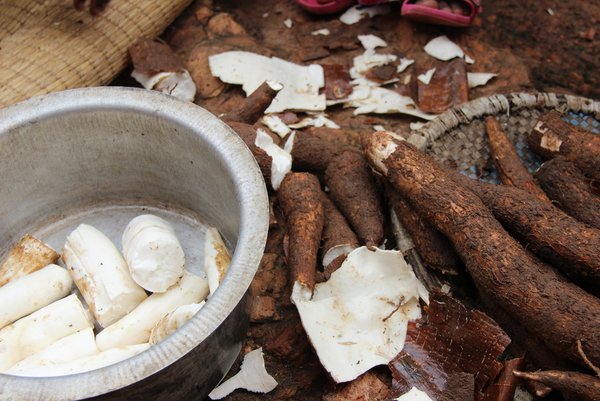- Share this article
- Subscribe to our newsletter
Fighting Cassava Brown Streak Disease in Africa
Cassava research conducted by the Department of Plant Viruses at the Leibniz Institute DSMZ-German Collection of Microorganisms and Cell Cultures GmbH in Brunswick, Germany, has been funded by the Bill & Melinda Gates Foundation since 2014.
On the occasion of a visit by Senior Programme Officer of the Gates Foundation Jim Lorenzen to the DSMZ, Stephan Winter, head of the plant virus research group, presented recent results of research related to cassava resistance in African varieties.
According to Winter, the researchers succeeded in finding resistances against African viruses in cassava varieties from South America. The viruses trigger a severe root rot, the Cassava Brown Streak Disease (CBSD), which leads to complete crop loss. So far, African cassava varieties have shown little resistance to these viruses, often leading to catastrophic crop failures. "As the disease continues to spread from East Africa to Central and West Africa and threatens growing in these regions, there is an urgent need to take countermeasures," explains Winter.
After extensive trials in the Brunswick research greenhouses, the resistant cassava plants from South America were sent to research stations in Kenya, Tanzania, Rwanda, Uganda and Nigeria to cross virus resistance in African varieties. Experiments in South Kivu in Eastern Congo which were evaluated after one year of field cultivation proved that virus resistance in South American varieties was also maintained in the field in Kivu. "The selected variants grow in Africa, retain their viral resistance to CBSD and remain healthy," says the DSMZ researcher.
South American cassava plants as a solution for Africa
During the visit of the Gates Foundation delegation, other common research projects were discussed. In addition to basic research on the resistance characterisation of South American breeding lines, they would above all be directly integrated in the breeding work of African partners, making new research results available to combating hunger in Africa. "After twelve months of field cultivation, the South American cassava seedlings are showing excellent resistance characteristics. However, there is still a need for research when it comes to establishing the plants in different growing regions. Nevertheless, the first steps towards resistant cassava plants in Africa have been taken," Winter states, summarising the current situation.
(DSMZ/wi)
More information:
Website of the Leibniz Institute DSMZ
Link to press release on the cassava resistance project at the DSMZ





Add a comment
Be the First to Comment